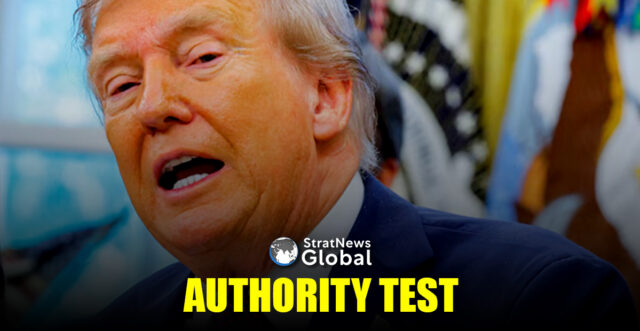U.S. President Donald Trump has tested the limits of executive authority through broad tariffs, immigration crackdowns, and an attempt to remove a Federal Reserve governor, actions likely to shape the U.S. Supreme Court’s upcoming docket.
“It’s about to be, ‘Does the president have the power to do that?’ season at the Supreme Court,” said Loyola Law School professor Jessica Levinson. “While each case brings up slightly different issues, when and if the Supreme Court tackles deportations, tariffs and the firing of members of executive agencies, the big question will be whether or not President Trump had the authority to take those actions.”
Trump’s administration appealed on Wednesday a lower court’s ruling last week that many of his tariffs pursued under a 1977 law meant for emergencies are illegal, urging the justices to fast-track their review of the case.
The case, and others making their way to the Supreme Court, will test just how amenable the justices are to the Republican president’s expansive view of his authority, and his administration’s ability to find novel ways to justify and carry out his agenda.
The court, which has a 6-3 conservative majority, has already handed major wins to the Republican president in his second term, granting emergency requests to implement his policies while challenges play out in lower courts.
The justices return in September from their summer recess and typically choose 60-70 appeals to hear. In the upcoming October to June term, they could rule on administration actions stemming from Trump’s sweeping claims of executive power.
“The scope of executive power has been – and will continue to be – the recurring legal issue of Trump’s second term,” said Robert Luther III, a George Mason University law professor. “And why wouldn’t President Trump want it to be? The Supreme Court has consistently backed his muscular assertions of presidential power.”
Tariffs
The 7-4 decision on August 29 from the U.S. Court of Appeals for the Federal Circuit addressed what Trump calls “reciprocal” tariffs announced in April as well as other tariffs imposed in February against China, Canada and Mexico.
At issue is whether Trump overstepped his authority in invoking the 1977 International Emergency Economic Powers Act to impose the tariffs, the first time the law was used for that purpose.
Trump has made tariffs a pillar of U.S. foreign policy, employing them to exert political pressure and renegotiate trade deals with exporting countries.
Immigration
Trump’s immigration policy has given rise to similar challenges. A New Orleans-based federal appeals court ruled on Tuesday that Trump’s reliance on a 1798 law to deport Venezuelan migrants accused of being gang members was likely unlawful. Historically, the law has been used only in wartime.
The Alien Enemies Act expansively empowers the government to detain and deport citizens of hostile nations in times of war or during an “invasion or predatory incursion.” The 5th U.S. Circuit Court of Appeals blocked the deportation of Venezuelan migrants under the law, rejecting the administration’s view that the Venezuelan gang Tren de Aragua had made a “predatory incursion” on U.S. soil.
This has been one of the few areas where the Supreme Court has pushed back on the administration so far. In May, the justices faulted his administration for seeking to remove Venezuelan migrants at a Texas detention centre without adequate legal process.
Fed Governor Cook
The limits of Trump’s authority lie at the centre of another case over his announcement last week that he was removing Lisa Cook from the Federal Reserve Board of Governors, which sets U.S. monetary policy.
Cook quickly filed a lawsuit seeking to block the move, setting up a legal battle that could upend long-established norms for the Fed’s independence.
The Trump administration has accused Cook, the first Black woman on the Fed board, of committing mortgage fraud, which she has denied. Cook also contends that, even if she made misstatements on mortgage applications, they do not give the president legal cause to remove her because she disclosed all the relevant information during her 2022 vetting.
The case has major implications for the Federal Reserve’s long-standing independence from political influence.
Other Cases
Trump’s moves to eliminate diversity initiatives, withhold grants and other congressionally appropriated funds and target transgender individuals, among other contentious issues, have drawn hundreds of lawsuits – many of which are rapidly advancing through the appeals process.
The Supreme Court has heard some of them on an emergency basis, as the administration fought attempts to stymie its policies while legal challenges continued. The court has sided with Trump in almost every case so far.
In May, the Supreme Court let the administration end Biden-era temporary deportation protections for hundreds of thousands of Venezuelans as it put on hold a judge’s ruling against the government. A San Francisco-based U.S. appeals court on August 29 upheld the judge’s ruling, setting up a further appeal.
In June, the court allowed the administration to deport migrants to countries other than their own – including politically unstable South Sudan – without a chance to show the harms they could face.
The court also backed Trump’s firing of Democratic members of federal labour boards and the top consumer product safety watchdog, boosting his power over federal agencies that Congress established as independent from presidential control.
The court also permitted implementation of his ban on transgender people in the military in May.
(With inputs from Reuters)





